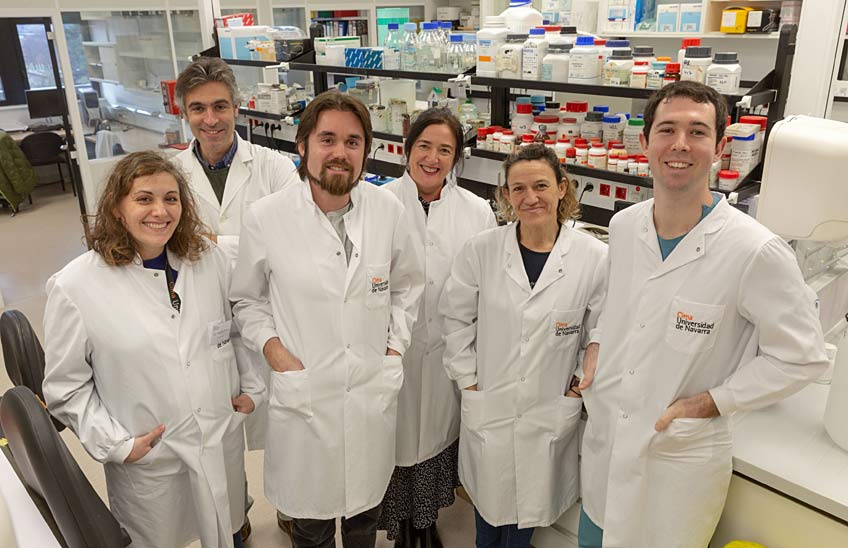Immunotherapy resistance mechanism unmasked
Researchers at Cima University of Navarra identify a new tumor escape process that conditions the efficacy of immunotherapy and present a new therapeutic strategy to reverse this process.

FotoManuel Castells<br>/Angelina Zheleva, Fernando Pastor, Daniel Hackbrett Meraviglia, Elena Villanueva, Beatriz Moreno e Iker Ausejo.
16 | 02 | 2023
Immunotherapy has become a very effective alternative in different types of cancer. However, the percentage of patients who benefit from this treatment is still limited due to multiple factors that limit the antitumor response.
Researchers at the Cimaat the Cancer Center Clínica Universidad de Navarra have discovered a mechanism of resistance to immunotherapy. Its blockade is presented as a target for the development of new anticancer drugs.
"Tumor antigens are essential molecules for the immune system to recognize the tumor and destroy it. However, the tumor itself often silences some high quality antigens so that they go unnoticed by the immune system and can escape the effect of immunotherapy," explains Dr. Fernando Pastor, researcher of the Molecular Therapies Program Cima University of Navarra and director of work.
In a previous study, Dr. Pastor identified that "Nonsense-Mediated mRNA Decay" (NMD) plays a very important role in the silencing of some of these antigens. Now, the team at Cima goes one step further: "In this work we have unmasked that it does so through signals that act in the tumor microenvironment and that are activated in response to the effect of immunotherapy. Specifically, we observed that NMD activity depends on the SMG1 gene, which is activated by inflammatory signals and limits the efficacy of the antitumor immune response. Furthermore, we show that blocking these signals improves the quality of tumor antigens and thus the response to immunotherapy." The results of this latest study have been published in the scientific journal Molecular Cancer.
Prognosis of lung, pancreatic, and breast cancer.
The work, carried out in animal models and in patients, confirms that the presence of low levels of the SMG1 gene is associated with a better prognosis in pancreatic, lung and breast cancer. It also suggests that these patients may respond better to immunotherapy.
Moreover, one of the peculiarities of this resistance mechanism described by the group of the Cima University of Navarra is that it is modulable and transient. "Specifically, we have found that it is activated especially during the immune response induced by immunotherapy treatments," says Dr. Pastor.
The work, carried out at the framework of the high school of research Sanitaria de Navarra (IdiSNA) and the CIBER del Cáncer (CIBERONC), has received funding from public and private institutions, such as the Ramón Areces Foundation.
